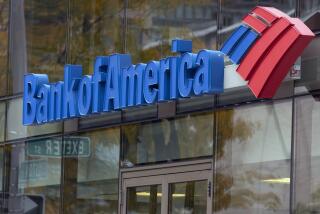One Facebook post becomes national movement to abandon big banks
When Kristen Christian learned that Bank of America Corp. planned to charge her a $5 monthly debit card fee, she did what many people do these days when they get mad: She ranted on Facebook.
What followed was an illustration of the power of social media.
Her Facebook post urging friends to abandon big banks unwittingly blossomed into a national campaign. More than 75,000 people have pledged to participate in “Bank Transfer Day” by moving their money from large U.S. banks to nonprofit credit unions by Saturday, Christian said.
The 27-year-old Echo Park resident has become something of a media star. Christian has appeared on national television programs to discuss the grass-roots movement that started with a couple of key strokes on her Mac and ended with credit unions bracing for a swarm of new customers.
“I definitely never expected it to become this big,” Christian said.
She started the campaign Oct. 4 by inviting 500 of her Facebook friends to abandon their banks. Christian said she would have been happy if just a few others joined her, but it became something much bigger.
About 650,000 U.S. consumers opened credit union accounts in the month since BofA announced Sept. 29 its planned debit card fee, according to the Credit Union National Assn., a trade organization. That compares to an average of 80,000 new members a month the rest of the year, the group reported.
Faced with mounting consumer criticism, BofA abandoned the planned fee Tuesday.
“I think we may look back in a few years and say that this was the spark that caused a lot of people to say, ‘Yes, credit unions are a better deal,’” Bill Cheney, chief executive of the credit union association, said in an interview Friday. “Because at a credit union the members are the shareholders.”
Bank of America spokeswoman Anne Pace declined to comment on the Bank Transfer Day campaign.
A poll released this week by research firm Harris Interactive portrayed big banks as vulnerable to losing customers to credit unions, regional banks and community banks.
Twenty-nine percent of Bank of America customers said they were not likely to remain with the company, compared with 22% at Wells Fargo and 21% at Chase, according to the poll. Just 3% of credit union members said they were not likely to continue the relationship.
Christian said BofA’s planned fee bothered her because it exempted wealthy customers who met certain balance requirements, meaning it would hit people who could least afford it.
The public outcry was a sign that BofA underestimated U.S. consumers, Christian said.
“The American people are done,” she said. “We’re done supporting businesses whose practices we don’t believe in.”
The public campaign against big banks carried a price. Christian said she received a death threat by telephone after one of her first television appearances.
As a result, Christian closed an art gallery she had run, fearful that it would be an easy place for the caller to find her.
“I can’t do the country much good if I’m dead,” she said.
Not everyone has been unhappy with Christian’s efforts. She said six men have proposed marriage. Even a Los Angeles Police Department officer who stopped her because of a burned-out tail light was impressed, she said.
“He told me, ‘You look really familiar. You’re the credit union girl!’” she said. “He gave me a fix-it ticket, but he also gave me a high-five.”
More to Read
Inside the business of entertainment
The Wide Shot brings you news, analysis and insights on everything from streaming wars to production — and what it all means for the future.
You may occasionally receive promotional content from the Los Angeles Times.











